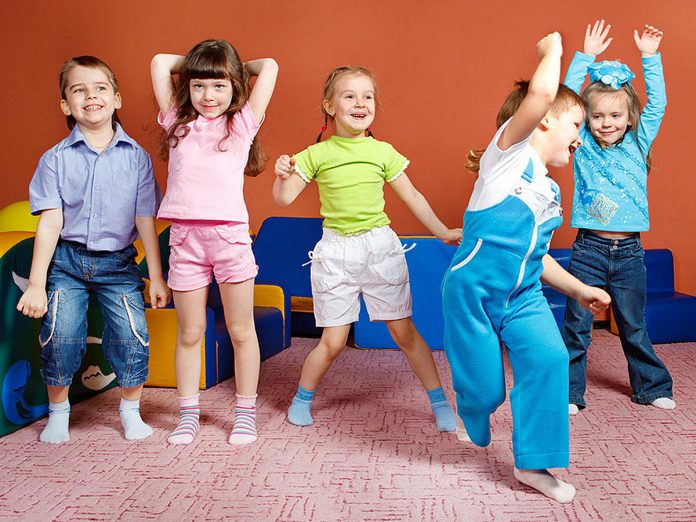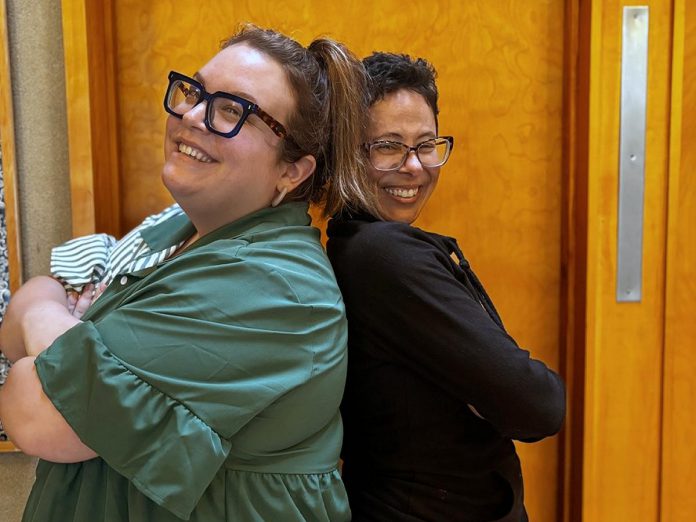
Who says improv is just for adults? According to early childhood educator Megan Walsh, the performance art teaches life skills that are valuable even for preschoolers.
“Ages four to six is the beginning of those important social skills from building confidence, practising taking turns, being brave enough to speak in front of a group, to working with others and exchanging ideas and materials,” she says. “A lot of this age is about finding their voice.”
Walsh is teaming up with Melody Hamilton to help young kids find their voice by leading Tiny Troupe, an eight-week improv session for children ages four through six. Held by the Peterborough Academy of Performing Arts (PAPA), the sessions will take place at St. James Church at 210 Romaine Street in Peterborough every Sunday from 3 to 4 p.m. from January 12 to March 2, 2025.
Walsh has been involved in PAPA since its founding by her mother Linda Kash and late father Paul O’Sullivan, having worked as a camp counsellor and led workshops with children of the older age brackets. But now that she commits her days to working with toddlers at Trent Child Care, she has thought about all the ways improv could benefit development from an early age.
“I was just talking to Linda one day about the benefits of improv for all ages, and how the skills you gain from improv can be applied through all ages and stages, and there’s nothing like that for our youngest age group,” Walsh says. “In early childhood care, we often come together as a group for morning check, for example, and I just realized that a lot of the activities or group cooperative games could be applied to improv and could be applied to their age group.”
The first Tiny Troupe class was held last winter, and was closely followed by a spring session. Walsh notes that given that the four year olds have just started school, for many of them “it’s just about playing with a group.”
“It’s a big mix of children who show an affinity for music and dance and performance within their home, but not so much in the school setting, and then there are the children who are more reserved, shier, and could use some tips to come out of their shell a little bit,” she says. “I think that improv and the arts in general do such a good job of bringing those two types of people together and building that community.”

Walsh adds that another key takeaway from improv classes at such a young age is instilling the knowledge that the goal is not to be perfect.
“The biggest part of improv is that it’s okay to make mistakes,” she says. “I feel in school and in early learning that is so structured, oftentimes we can walk them through and just go through the motions without allowing that. It’s just so important to give that structured time to just be silly, to make mistakes, to fumble over your words, and to see grown-ups doing the same.”
Throughout the eight-week program, Walsh and Hamilton — who is a co-worker of Walsh’s at the daycare and also has experience at PAPA — will lead the young participants in “very basic” improv and theatre games, often including song and music, that encourage cooperation and speaking in front of peers.
“With their age and stage, it’s a lot of pretending or imaginary play,” Walsh says. “I don’t think people understand how many of the basics of improv are just letting them pretend and letting them play. There’s so much learning that happens through play.”
Since children are oftentimes at different stages of development, Walsh provides room for flexibility and adaptability within the program to meet the cohort’s needs and goals.
“Sometimes the group dynamic needs more focus on having a turn speaking to a group by themselves, but other times it’s a group that’s very confident and that’s not something we need to work on,” she says. “In that case, it would be a lot of performing on their own or including music if they’re interested, so it’s really gauging it based on their age and stage and what they’re interested in.”
Given their backgrounds in early childhood education, Walsh and Hamilton foster a space for children of all abilities.
“The best part is improv can be non-verbal, improv can be from a wheelchair, improv can be for various levels of development,” says Walsh. “We at PAPA have always very much been an inclusive space for all ages and stages of development and levels of physical ability to come together.”
Walsh has already seen how this can happen through the first two Tiny Troupe cohorts of PAPA.
“Sometimes in the very first class, parents will participate with us, because often the kids aren’t even looking us in the eye, but by the end they’re showing independence and they’re not wanting to go home when the hour is over, ” she says. “We so often lose track of that hour too, because it just is so much fun.”
Tiny Troupe sessions are priced at $130 plus HST and can be booked at lindakash.ca/linda-classes-and-camps.


























